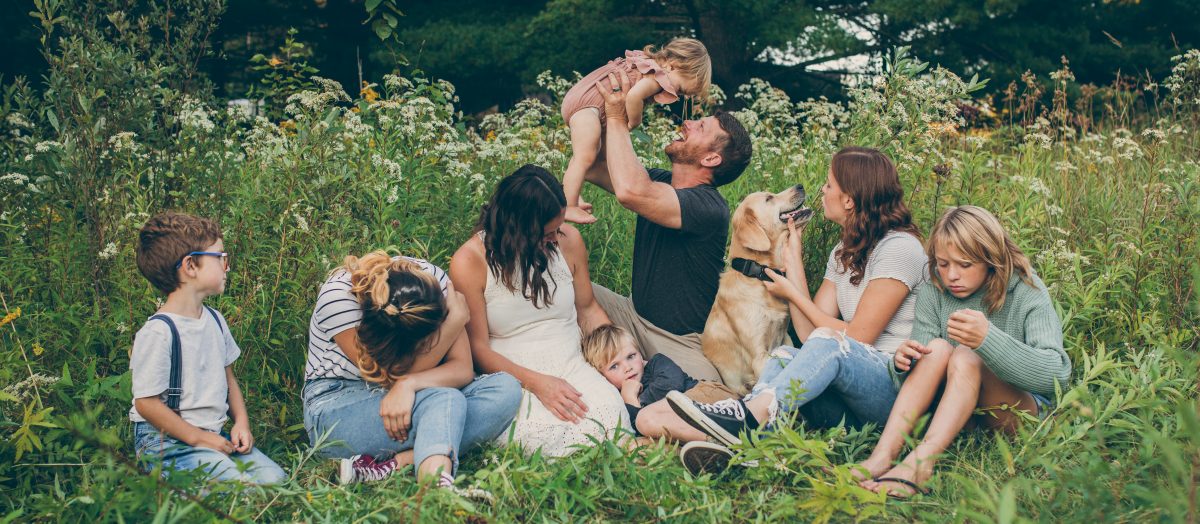Moving our family to a little falling down farm on the edge of town has been an adventure in so many ways.
This move was birthed out of a myriad of desires, passions and ambitions.
One of those was the desire to give our children the gift of a simplistic childhood.
I grew up on a dairy farm in Wellington County where I spent my summers crawling over straw bales, running barefoot through the yard, nestling fluffy kitten fur up against my cheek, climbing trees, eating apples plucked from our orchard and wading through muddy creeks.
I had no idea how magnificent this childhood experience was or how much texture and depth these experiences added to my life.
I didn’t know that I was learning to take risks as I rode my bike down the barn steps and balanced precariously upon barn top beams, determined to keep up to my older siblings and cousins.
I didn’t know that the wide variety of sensory experiences were contributing to brain development as I felt mud between my toes, rocks beneath my calloused feet and dirt under my hands.
I took for granted the way I could walk out the doors and roam free for hours, with no specific goal or destination in mind, just freedom to be and explore my world as I wished.
Every summer my skin would turn brown beneath the sun’s warmth, my dark hair deepening to hues of auburn and chestnut.
I thought it was normal for children to sit high in the branches of a pine, bare legs swinging, to make forts in the barn loft or catch frogs in the pond.
As I grew and left my childhood behind, I left many of these simple pleasures with it.
Now, I look at my children and I would give anything to be able to give them a taste of the life I once lived. Not only because of my own fond memories but because the more I learn, the more I realize that this kind of environment nurtures healthy, happy children.
Children are meant to be able to learn and explore and fall and laugh. They are meant to experience freedom and follow their curiosity and dig through the layers of a richly textured world.
So how do we do this?
How do we give our children the gift of simplicity, setting them free from the demands of a society who would want to categorize them, sit them down, mold them into tiny adults?
- Let them play. They are little for such a short time, and for some reason we feel we need to organize them; sort them into categories, grade their achievements, nudge them toward accuracy and reality. But children have rich, creative minds. They see the world differently. Good and evil stand in stark contrast, and they will recreate this in their play. Every little bug in the dirt or tattered leaf or knobby stick can be studied, delighted in and recognized to be something magnificent. Give your children space to play freely. Do not fill their time or their rooms with too many toys that will entertain them and tell them what they should do and how they should do it. Instead, give them a bucket of plain wooden blocks. Dump out a bin of Lego builders. Leave some paper, crayons, glue and scissors on the table and see what they create. When they bring you their stories and structures and collections, admire them for what they are. Ask them questions and let them decide what they have created, don’t assume or pass judgment.
- Give them structure. This may seem contradictory to play, but really it is what makes the play possible at all. Children thrive when they are surrounded by comforting absolutes. Too many variables make children, especially young children, feel vulnerable and unsure therefore discouraging them from following their naturally inquisitive minds because they are too busy worrying about what they might need or miss. Predictable meal times and bed time routines are essential and create a rhythm to your days that wraps them in security and comfort. Knowing what to expect their days will look like, generally of course, helps children to relax inside those parameters and busy themselves with the great work of childhood…play. Children who feel safe can explore and create and learn.
- Take them outside. Snow, rain, sun, sleet…let them experience it all. Nature is full of endless entertainment for children. Mud puddles, trees to climb, birds nests, caterpillars, water, ice and dirt. Invest in mud suits, rubber boots, warm clothes and ratty old jeans that you won’t mind getting torn and ripped. Give them shovels, containers, watering cans and buckets. Go for walks both on sidewalks and off; a walk to the park and a hike through the bush can be equally exciting for a child. Let them get messy; let them take risks, even fall down and hurt themselves every now and again. Eat outside, read outside, play outside and even nap outside. Go to the beach, the park, the forest, the farm, the backyard. Build a sandbox, set up a bucket of water or a plastic pool, ride bikes, blow bubbles, go barefoot. All these experiences feed the soul of a child. Not only will this environment be beneficial to their brain health but it will also give them the best chance at being healthy emotionally and spiritually.
- Give them rest. This includes physical, emotional and mental rest. Create a solid, dependable, practical bedtime/nap time routine and stick to it. Kids need plenty of sleep. In fact, ironically it seems the more sleep they get the more sleep they need. Tired kids will have a hard time playing or resting well. Try to balance your day with both active and restful activities. For example, an hour or two of outside time might be followed up with some stories on the couch. Playing play dough might precede going to the grocery store or some other outing that is more chaotic. If older kids complain of being bored, don’t become too anxious about filling that space for them. It’s necessary for them to learn how to enjoy their own company and not be afraid of the quiet. Teach them how to be able to sit and look at books, to be still and watch a tiny ant carrying his disproportionate load, to breathe in deeply in and out and feel their muscles relax from head to toe. Surround them with quietness, peace and stillness regularly.
- Involve them in responsibilities. Kids love to help when they feel they are wanted and needed. There is nothing that can replace the pride of knowing you have done a job well. Provide plenty of opportunities to work both alongside you and independently. Participating in family chores fosters responsibility, healthy self image and gratitude. Teach them to cook and do laundry. Don’t shy away when they sigh at being told once again to unload the dishwasher or help set the table. Praise them for jobs well done and send them back to redo jobs done haphazardly. Will they thank you down the road? Probably not. But that is beside the point. They are learning they are a part of something. They are seeing the real life in front of them and will start to notice what others around them are doing. You will know you are on your way when they thank you for doing their laundry, unloading the dishwasher or picking up their scattered shoes.
Children need so much from us, and yet so little. They require huge quantities of our emotional and physical presence with them but they require so few resources to truly grow and thrive.
We cannot travel the world today and give their little eyes the sights of the Great Wall of China, the Eiffel Tower, the Grand Canyon and and Cliffs of Moher…but we can go outside and see the birds and feel the mud under our rubber boots and watch our chickens peck away at the rinds of a cantaloupe.
We cannot afford private music lessons to entice their musical little minds toward Mozart greatness, but we can turn on some nursery rhymes and beat to the rhythm on our homemade drums.
My preschoolers are at home with me. They do not play in sensory buckets every day, practice lining up at the door, learn rhymes and riddles for every activity or get exposure to early learning curriculum….but I can let them help me bake muffins, teach them how to zip their jackets, sit on the floor and build towers of blocks with them or read them story after story.
Reminding my mother heart of these time-proven child raising truths has helped me to refocus my parenting on what is most important. When I fall into despair because I cannot possibly do it all, I can come back to this and remind myself of what I can do today that is valuable.
-AF

